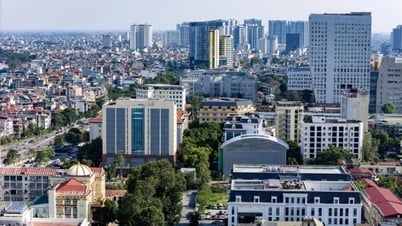The French National Assembly on March 20 rejected a no-confidence motion against President Emmanuel Macron's government, paving the way for a controversial bill to raise the retirement age in France from 62 to 64 to become law.
The change to France’s pension system, which Mr Macron has sought since the start of his first term as president in 2017, has sparked two months of protests, strikes and occasional violence. It has divided France, with polls consistently showing two-thirds of the population opposed to overhauling the country’s pension system.
Now, with this result, the protests and anger across France are unlikely to abate in the coming weeks. They seem certain to overshadow Macron’s second term as president, just as the Yellow Vest protests marked his first.
What's Behind the 9 Missing Ballots?
The no-confidence motion against President Macron's government – submitted by a coalition of centre-right and left-wing parties – received 278 votes in favour, nine short of the 287 needed to pass.
Analysts had previously said that Mr Macron’s opponents were unlikely to get the 287/577 votes needed to “oust” the current French government. Therefore, what was shocking was not the failure of the no-confidence motion, but the close result on which President Macron’s government relied to continue operating.
The close result reflects the anger gripping a nation over the pension overhaul, Mr Macron’s “apparent alienation”, and the way the government used Article 49.3 of the French constitution to pass the bill without a full vote in parliament.
A scene inside the French National Assembly in Paris, March 20, 2023, as lawmakers protest against President Emmanuel Macron's pension reform plan. Photo: AP/Market Watch
Following the announcement by French National Assembly President Yaël Braun-Pivet that “the motion of no confidence was not passed”, boos rang out throughout the parliamentary chamber.
Members of the hard-left party France Unbowed were quick to hold up signs reading: “No to 64 years old” and “Meet in the streets”.
In addition to the no-confidence motion that won 278 votes in favor, a second no-confidence motion – submitted by Marine Le Pen's far-right National Rally – also failed, with only 94 lawmakers voting in favor.
The government had “dodged a bullet,” said Ms Le Pen, a fierce critic of raising the retirement age.
After the vote was over, lawmakers stormed out of the chamber and down the stairs, declaring to a crowd of reporters waiting downstairs that they would continue to fight.
“Only nine votes short,” Mathilde Panot, leader of the France Unbowed party in parliament, declared into a bank of microphones in the gilded ground-floor room where reporters frequent and lawmakers speak.
Ms Panot also called on Prime Minister Elisabeth Borne to resign, summarising the situation as a “political crisis of Emmanuel Macron’s own making”.
Socialist Party leader Olivier Faure said Mr Macron could not continue as if the acrimonious vote of no confidence had never happened. “If he wants to breathe some oxygen, he has no choice but to drop the bill,” Mr Faure told another group of reporters nearby.
Standing in one corner was Pierre-Henri Dumont, a lawmaker from the center-right Les Republicains (Republicans) party, which holds the deciding vote. In recent days, his party’s leadership has struggled to contain “rebel” members who are threatening to help “bring down” the government.
In the end, even though a third of the party's members voted in favor of the no-confidence motion, it was not enough to make a difference.
What happens next?
With no-confidence motions having failed, President Macron's pension reform bill is likely to be passed into law, raising the retirement age for most workers from 62 to 64 by 2030.
Now, Mr Macron, who cannot run again in 2027, believes he has laid the groundwork for the massive investments in defence, green energy, schools and technology needed for France ’s future. But with more than four years left in his term, between now and 2027, Mr Macron will face more hostility than ever.
Lawmakers opposed to President Macron and his pension overhaul are exploring legal ways to thwart his plans, but none are certain to work.
Some lawmakers have begun a procedure that would allow them to trigger a referendum – an incredibly long and complicated process that has never yielded results before.
Protesters at Place Vauban in Paris on March 20, 2023, protesting against the French government's overhaul of the pension system. Photo: Shutterstock
Other lawmakers have vowed to challenge the new pension law before the Constitutional Council, a body that reviews legislation to ensure it complies with the French Constitution – mainly on the grounds that the government included pension reform in the social security budget bill while some pension changes are not directly related to the budget.
But it is unclear how the Constitutional Council will ultimately rule, or which parts of the law it might strike down. So far, the French government has expressed confidence that the core of the law will stand.
Other lawmakers and union leaders say only a new wave of strikes and protests will convince Mr Macron not to push through his pension reform.
“Since parliamentary censorship is not working, it is time to move to popular censorship,” said Jean-Luc Mélenchon, leader of the left and founder of the France Unbowed party.
There is a precedent: In 2006, the French government scrapped a youth employment provision even though it had already become law.
In this case, it remains to be seen whether Mr Macron will accept the continued pressure coming from the masses on the streets .
Minh Duc (According to NY Times, CNBC)
Source


![[Photo] General Secretary To Lam works with the Central Policy and Strategy Committee](https://vphoto.vietnam.vn/thumb/1200x675/vietnam/resource/IMAGE/2025/5/28/7b31a656d8a148d4b7e7ca66463a6894)

![[Photo] Prime Minister Pham Minh Chinh receives a bipartisan delegation of US House of Representatives](https://vphoto.vietnam.vn/thumb/1200x675/vietnam/resource/IMAGE/2025/5/28/468e61546b664d3f98dc75f6a3c2c880)
![[Photo] Vietnamese and Hungarian leaders attend the opening of the exhibition by photographer Bozoky Dezso](https://vphoto.vietnam.vn/thumb/1200x675/vietnam/resource/IMAGE/2025/5/28/b478be84f13042aebc74e077c4756e4b)
![[Photo] 12th grade students say goodbye at the closing ceremony, preparing to embark on a new journey](https://vphoto.vietnam.vn/thumb/1200x675/vietnam/resource/IMAGE/2025/5/28/42ac3d300d214e7b8db4a03feeed3f6a)




















































































Comment (0)